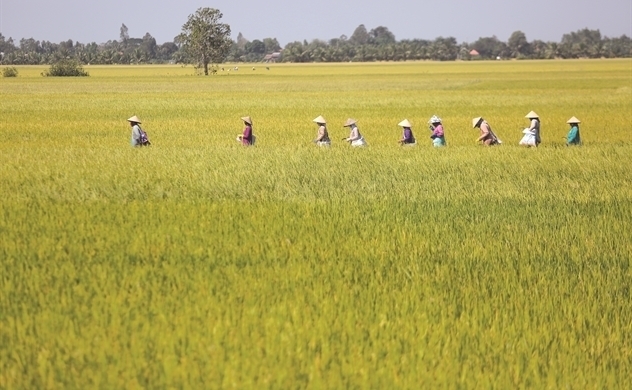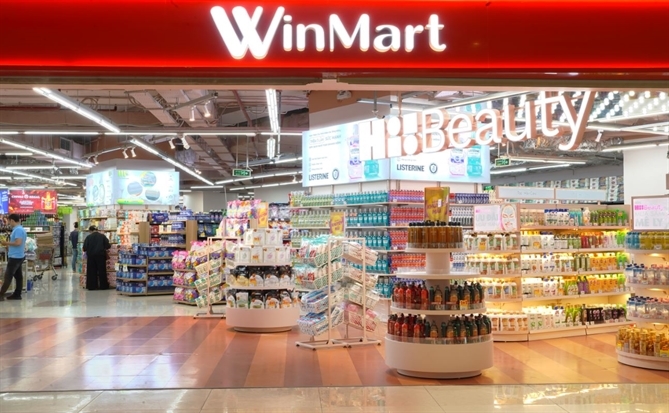Rising rice prices could send exporters into a price trap

There is a paradox that when the export price increases, the domestic rice price will increase accordingly, even higher. Photo: Quy Hoa.
"Every day, rice prices increase by 200–300 VND/kg, causing us a lot of headaches and forcing us to figure out how to cleverly adjust and retain customers," said Ms. Oanh, the owner of a rice sales agency in Ho Chi Minh City.
Price of rice keeps increasing
The last 18 years have never seen farmers as affluent as they are today when their tens of hectares of fields "wined the season with the price" unexpectedly. Traders began seeking rice for reserve when they aggressively gathered rice. Even rice sellers, who measure each pound, are trying to lower the field stakes after a month of "standing rice". The race to find rice raises prices daily. Rice cost 6,900 VND/kg the previous week, while it cost 8,050 this week.
The rice-purchasing and exporting enterprises themselves cannot compete with traders. Ms. Duong Thanh Thao, Director of Ong Tho Rice Joint Stock Company, shared: "It is very difficult for businesses to buy rice right now."
In reality, merchants ordered rice fields in the fields, while companies had to collect commodities to fulfill signed orders at cheap rates earlier. Others don't have an order but don't want to sell since the price rises 2-3 times every day, according to Ms. Thao.
Mr. Phan Van Co, Marketing Director of Vrice Company Limited, added: “More than 95% of the summer-autumn rice area of farmers received deposits from traders 20-30 days before harvest. Therefore, when the price of rice increases, the trader is the one who makes the most profit, and the farmer only gets a small part.
Pham Thai Binh, General Director of Trung An Hi-tech Agriculture Joint Stock Company (Can Tho), said: “There are a large number of traders who have gathered goods since India just banned the export of rice and are not selling, causing the price of rice to increase continuously like in the past days.
Climate change has threatened food security worldwide. Some nations have restricted rice exports, which has driven up global rice prices since demand exceeds supply and many countries are buying rice to meet local needs. The global rice price will rise soon, "Professor Dr. Vo Tong Xuan said.
The situation heated up when India, the world's biggest rice exporter (40%) stopped shipping some plain rice. After that, Russia and the UAE prohibited exports. Vietnamese rice's global price rose steadily over the previous two weeks to about 660 USD/ton with 5% broken rice. Many markets including China, the Philippines, and Indonesia, are fighting for Vietnamese rice at 40% to several dozen times.
According to a report by the United Nations World Food Program (WFP), the world is facing a food crisis "of an unprecedented scale, the largest in modern history". Fitch Solutions forecasts that global rice production is decreasing, causing a rice deficit of up to 8.7 million tons. The deficit will keep rice prices high until 2024.
Meanwhile, the trend toward food security protection is spreading. According to the Food and Agriculture Organization of the United Nations (FAO), the proportion of countries and territories that are not food secure accounts for 30.4% of the world's population. Therefore, now there are nearly 30 countries that have tightened, limited, or halted food exports to protect domestic supplies.
Mr. Do Ha Nam, Vice Chairman of the Vietnam Food Association (VFA), said that when importing nations learned India restricted shipments, they contacted Vietnamese enterprises and published a statement. greater purchase price. That affected the local rice market and raised rice prices in recent days.
Opportunity comes with challenges
Vietnam learned a lesson in 2008 when the price of rice skyrocketed, but the country outlawed exports, so it squandered the chance. Because it is probable that after India stabilizes the situation, domestic rice prices will return to the market, causing rice prices to fall. Mr. Tran Thanh Hai, Deputy Director of the Ministry of Industry and Trade's Import-Export Department, said that this is an excellent chance for Vietnamese exporters.
"This is a very encouraging sign for Vietnamese exporters looking to increase rice exports in the near future." "However, traders must also have calculations and tools to avoid risks, such as price risk and contract risk," Mr. Hai said.
According to information from Loc Troi, this group and its partners have approved the purchase, sale, and export of rice to Indonesia and/or Malaysia to be carried out in 2023, with a maximum transaction value of $127 million. General Director of Loc Troi Nguyen Duy Thuan was assigned to represent the Company to sign the bidding documents (if any), and bids, related to the above transaction.
With the current price, only businesses that are lucky to have their goods because they have been collected before will not be affected, such as Phuoc Thanh IV. Mr. Nguyen Van Thanh, Director of Phuoc Thanh IV Company, said that the major contracts in 2023 with the Philippines market have been completed by this business. Recently, the company also signed a contract with the Philippines market at $710/ton.
In fact, besides being difficult to purchase, exporters also expressed concern because they do not want to sign new export contracts and do not want to offer them for sale at the moment. Mr. Pham Thai Binh of Trung An said that currently domestic rice is sold at an average price of 7,000 VND/kg. At this price, if exporting must be over 600 USD/ton, the business will be profitable (Vietnam's export price at the moment is less than 600 USD). However, there is a paradox that when the export price increases, the domestic rice price will increase accordingly, even higher, making businesses not interested in signing new contracts.
“We are still delivering orders for contracts signed more than a month ago. Since the time India issued a ban on rice exports so far, we have not signed any new contracts, because although the price of rice is in a favorable direction, in fact, if businesses sign again, it is very risky. ro”, Mr. Binh added.
For large orders from several tens of thousands of tons, due to the lack of goods to deliver, some businesses had to ask to delay the delivery time. At Trung An Company, Mr. Pham Thai Binh said, if calculated according to the current domestic price of rice, the business must offer to sell at 670 USD/ton to make a profit. However, the enterprise currently cannot offer the above price, not to mention the contracts signed a few months ago, the price is below 600 USD/ton.
“If you continue to sell, you will lose money. We were forced to negotiate with our partners to delay the delivery time to the winter-spring crop. Fortunately, the partner also sympathized and agreed to delay the order of about 20,000 tons to a more appropriate time to avoid buying at a high price at this time", Mr. Binh added.
Not only Trung An, many other businesses were also forced to negotiate to delay delivery to September 2023 because it was difficult to purchase, and some businesses even canceled the contract.
Forecasting about the market from now until the end of the year, businesses said that the rice market will continue to have strong fluctuations. In that context, to avoid risks, businesses will not sign too large contracts, but prefer small, short-term contracts, especially when there are enough new customers to sign new contracts.
Like Trung An, Mr. Phan Van Co of Vrice said that the current offer price for the contract for September-October 2023 delivery of this business with white rice is 570 USD/ton, Jasmine rice is 680 USD/ton, with varieties Japanese rice is 750 USD/ton, up 60-70 USD/ton compared to the previous one.
According to Mr. Co, usually businesses sign contracts with farmers 1-2 months in advance, then purchase and export. These contracts are deposit contracts, signed basically, in terms of content still adjusted according to the market price.
“Usually, we only sign a contract of 50-60%, not a 100% contract in advance, so since India, Russia, and the UAE banned exports, causing domestic rice prices to rise, businesses that bought back suffered losses. Because the signed export contracts are now required to deliver, but in the export market every increase of about 15 USD / ton, the domestic price doubles, ie about 30 USD / ton," said Phan Van Co. let me know.
Therefore, Vrice's solution at this time is to maintain export guarantee for signed contracts, and customers with new needs must renegotiate the price.
Acknowledging this situation, Mr. Do Ha Nam of VFA said that the recent hot increase in Vietnamese rice prices came from the reason that businesses boosted purchasing to pay for signed export contracts. Currently, the domestic rice price is higher than the export price, which is unreasonable, so it will soon stop when businesses buy enough goods.
"With the current high price of rice, businesses that have not had orders nor dare to buy for fear that India will return to the market, the price will "collapse". Based on the available data, India still has a surplus of rice that needs to be exported, they only ban exports to cool down domestic prices. The excessive price of rice is not beneficial because only about one-third is for export, two-thirds for domestic consumption," said Mr. Nam.
Sharing the same view, Mr. Phan Van Co said that India only banned exports with commercial contracts, while intergovernmental contracts were still implemented normally. Therefore, it is likely that the rice price will be stable until the end of August 2023.

 TIẾNG VIỆT
TIẾNG VIỆT 

_131447820.png)














